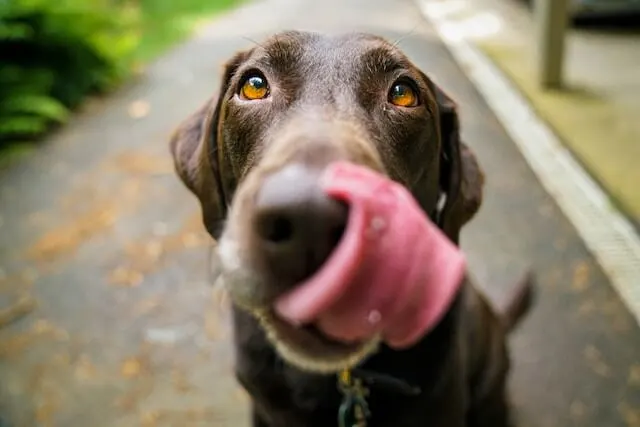If your question is, can dogs eat sauerkraut? Then you are at the right place. As pet owners, we constantly strive to provide our furry companions with the best nutrition possible. This often leads us to explore various human foods and their suitability for our dogs.
One such food that has gained attention is sauerkraut. But can dogs eat sauerkraut? In this article, we’ll delve into this question and provide you with all the information you need to know about sauerkraut for dogs.
Sauerkraut and Dogs: A Closer Look
Sauerkraut, a fermented cabbage dish, is not only a staple in many human diets but has also caught the curiosity of pet owners seeking to offer a diverse range of foods to their dogs. When it comes to sharing sauerkraut with your furry friend, it’s important to understand that moderation and careful preparation are key.

Can Dogs Eat Sauerkraut? What are the Benefits?
Following are some well-known benefits of feeding Sauerkraut to dogs.
Probiotics Galore
Sauerkraut is rich in probiotics, the “good” bacteria that promote a healthy gut. Just as they do for humans, probiotics can help dogs maintain a balanced gut flora, leading to improved digestion and overall well-being.
Nutrient Boost
Sauerkraut for dogs’ benefits include essential nutrients like vitamins C and K, as well as minerals like potassium. When fed in moderation, these nutrients can contribute to your dog’s health.
Aiding Digestion
The fermentation process in sauerkraut breaks down some of the fibers in cabbage, making it easier to digest. This can be particularly beneficial for dogs with sensitive stomachs.
Pro-bowl-tics for Pups: Exploring sauerkraut’s ‘gut’-sational benefits for dogs!
Can Dogs Eat Cooked Sauerkraut?
Can a dog eat sauerkraut? Yes, dogs can eat cooked sauerkraut. In fact, cooking the sauerkraut can soften it further and reduce its natural tartness. This might be helpful for dogs who are picky eaters or have difficulty chewing.
Can dogs eat canned sauerkraut?
Yes, dogs can consume plain canned sauerkraut in small amounts, as long as it’s free from added spices, seasonings, or excessive salt. However, it’s always advisable to consult your vet before introducing any new human foods, including canned sauerkraut, into your dog’s diet.
Sauerkraut for Dogs with Blockage
While sauerkraut has its merits, it’s crucial to be cautious. If your dog is experiencing a blockage in their digestive system, sauerkraut might not be the best option. So, If your question can dogs eat sauerkraut? Yes, but the fiber in sauerkraut could potentially worsen the blockage or cause discomfort.
Portion Control: How Much Sauerkraut for Dogs?
When introducing sauerkraut into your dog’s diet, start with small portions. A tablespoon or two, depending on your dog’s size, is a good starting point. Observe how your dog reacts to this new addition and monitor their digestive health.
Which Is The Best Sauerkraut for Dogs?
Opt for plain, unsalted sauerkraut without any additional spices or additives. The best sauerkraut for dogs is the one that is simple and free from potential allergens or ingredients that could be harmful to your canine companion. Can dogs eat pork and sauerkraut? Yes! But only in moderation.
Sauerkraut Sense: Serving up the ‘brine’ truth about dogs and cabbage.
Sauerkraut for Dogs Recipe
How can dogs eat sauerkraut? If you’re interested in making sauerkraut for your dog, here’s a simple recipe:
Ingredients
One small head of cabbage
1-tablespoon non-iodized salt
Instructions
- Remove the outer leaves of the cabbage and set them aside.
- Shred or finely chop the cabbage.
- In a mixing bowl, combine the shredded cabbage and salt.
- Massage the cabbage and salt mixture for about 5-10 minutes, allowing the salt to draw out moisture from the cabbage.
- Pack the cabbage tightly into a clean glass jar, pressing it down as you go to eliminate air bubbles.
- Place one or two of the reserved cabbage leaves on top of the packed cabbage to help keep it submerged.
- Cover the jar with a clean cloth or paper towel and secure it with a rubber band or string.
- Allow the jar to sit at room temperature for about 1-2 weeks, for fermentation progress.
- Check the sauerkraut periodically to ensure it stays submerged and doesn’t develop mold.
- Once the sauerkraut reaches your preferred level of tanginess, transfer it to the refrigerator to slow down the fermentation process.
Remember, this homemade sauerkraut is for your dog, so refrain from adding any additional seasonings or spices.
Other Related Articles
Conclusion
Can dogs eat sauerkraut? Yes, sauerkraut can be a healthy addition to your dog’s diet when fed in moderation and prepared with their specific needs in mind. The probiotics and nutrients in sauerkraut can contribute positively to your dog’s overall health, especially its digestive system.
However, it’s essential to exercise caution and avoid sauerkraut if your dog has a digestive blockage.
Is it safe for dogs to have sauerkraut?
Yes, sauerkraut is safe for dogs in small amounts as it may provide probiotic benefits, but consult your vet before adding it to their diet.
Is sauerkraut good for dogs’ gut health?
Yes, sauerkraut can potentially support dogs’ gut health due to its probiotic content, aiding digestion when given in moderation.
Can my puppy eat sauerkraut?
Yes, puppies can eat sauerkraut in moderation, but consult your veterinarian before introducing it to their diet to ensure it’s appropriate for their age and health.
Can dogs eat red sauerkraut?
Yes, dogs can eat red sauerkraut in moderation, as long as it doesn’t contain harmful additives like onions or excessive salt.
